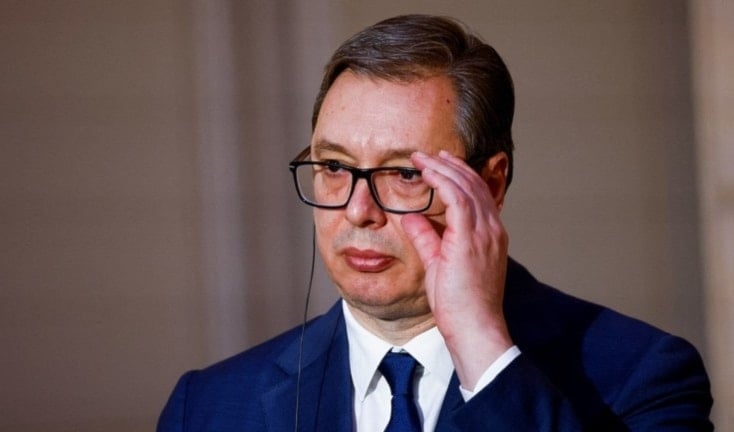Russia warns Serbia of potential coup ahead of eco protests
The protests stem from the government granting a license to Rio Tinto, enabling the company to develop a lithium mining project that activists claim has environmental and health consequences
-

Serbian President Aleksandar Vucic addresses reporters at the Elysee Palace in Paris, France, April 8, 2024. (AFP)
Russia warned Serbia about a potential coup attempt to overthrow the country's leadership ahead of expected ecological protests in Belgrade, President Aleksandar Vucic told journalists on Friday.
“We received official information from the Russian Federation, information transmitted and brought through official channels,” the Serbian president said, adding that Serbia's Security Intelligence Agency (BIA) is “dealing with it” by following up on leads provided by Russia, asserting there is no reason to worry.
Vucic did not disclose where or from who the threat came from, but he assured that “Serbia is moving forward and they cannot and will not stop it."
Ecological protests against Serbia's latest mining project
Vecernje Novosti, a daily Serbian newspaper, reported on Friday that it acquired a "color revolution handbook" allegedly published for activists expected to take part in Saturday's potential ecological protests.
The news outlet revealed that the handbook describes methods that correlate with color revolutions in other countries, highlighting the protests are likely to coordinated from "centers of power" abroad, without accusing anyone in particular.
The potential demonstrations stem from the government granting Rio Tinto, an Anglo-Australian major mining corporation, a license to develop a lithium mining project in Serbia's Jadar region, which is poised to become the largest in the continent, according to Reuters.
The project received backlash from farmers and villagers who argued that the surrounding area would be severely polluted from lithium mining.
Activist and farmer Zlato Kokanovic told Reuters that the mine would “free the European Union from reliance on China” at the expense of Serbians' health.
The $2.4 billion lithium project is viewed as a significant economic boost by the Serbian government that could cover 90% of the European Union's lithium necessities, Reuters reported. However, eco-activists demanded the government terminate the project by August 10, vowing to announce their next steps in demonstrations on Saturday.
Serbia plans 2028 lithium mining start with Rio Tinto, EU assurances
The Financial Times reported on June 16 that Serbian President Aleksandar Vucic has signaled plans for the country to tap into its lithium reserves as early as 2028.
In his remarks to FT, Vucic disclosed that Rio Tinto and the EU have provided "new guarantees" regarding adherence to stringent environmental standards.
"If we meet all requirements, (the mine) could begin operations in 2028," Vucic said, noting the potential transformative impact of the project on Serbia and the broader region.
Rio Tinto has identified the Jadar site in western Serbia as holding one of Europe's largest lithium reserves, a critical resource for the production of electric vehicle batteries. Although the deposits were discovered in 2004, the Serbian government suspended the mining project in 2022 following environmental and public health concerns that sparked widespread protests.
The president stated that the mine aims to produce 58,000 tonnes of lithium annually, equivalent to powering 17 percent of Europe's electric vehicle production or approximately 1.1 million cars.
Critics of the project, including environmental groups and local activists, had previously accused Rio Tinto and Vucic's government of lacking transparency and failing to disclose comprehensive environmental impact assessments.
In response to these concerns, Rio Tinto released an environmental impact report aimed at addressing fears and reshaping the narrative surrounding the project. The mining company vowed to employ "safe, reliable, and proven technology," while denouncing what it described as a misinformation campaign against the initiative.
Furthermore, in September 2023, Serbia signed a letter of intent with the European Commission to forge a strategic partnership focused on batteries and raw materials, underscoring the geopolitical and economic significance of the lithium project.

 4 Min Read
4 Min Read








